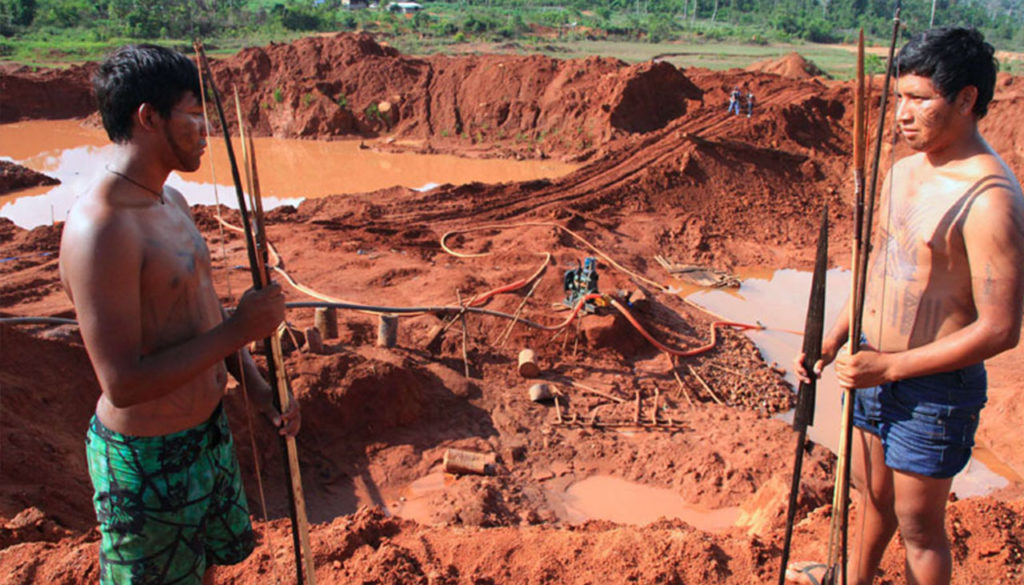RIO DE JANEIRO, BRAZIL – Brazilian President Jair Bolsonaro announced that on Thursday he would submit a bill to Congress enabling mineral exploration, the installation of oil and gas fields, and the generation of electricity on indigenous lands.
Currently, there is no statutory regulation of the question, despite being provided for in the Federal Constitution. As a result, there are no official mining operations in the 619 indigenous areas located in the country, although there are reports of dozens of illegal mining operations, mainly in the Amazon region.

The bill also provides for the authorization of the exploitation of indigenous territories for tourism, agriculture, cattle raising or logging. Authorization for land use will be granted by the legislature and indigenous people living in these communities will be heard, but will not have the right to veto. Throughout the year, the Chamber and the Federal Senate will be required to examine the issue, which is the cause of criticism from indigenous communities, indigenous activists and environmentalists.
The main argument against the economic exploitation of these areas is that the activities will unbalance the communities, hasten deforestation and the disappearance of native species – the most recent 2019 UN report, which alerts to the speed with which species are becoming extinct (one in eight is endangered), points out that this destruction of nature is slower in the lands where indigenous peoples live than in the rest of the planet.
During the announcement, in a ceremony at the Planalto Palace where the administration celebrated its 400-day anniversary, the president pressured the legislature to pass his bill and said that if he could, he would confine environmentalists to the Amazon. “The major step depends on Congress, they will suffer pressure from the environmentalists. If I can, one day I’ll confine them to the Amazon, since they love the environment so much, and stop disturbing the Amazonians from within the urban areas”.
Since the beginning of his administration, Bolsonaro has been the target of protests from environmentalists. The criticism became more intense after the series of forest fires in the Amazon, which in 2019 suffered a 30 percent increase in burnt area compared to the previous year.
During the same ceremony on Wednesday, the president again stressed his views on the indigenous people. He only changed the speech somewhat. In January, he stated that “more and more the Indians are human beings just like us. Now he said: “The Indians are human beings exactly like us. They have heart, they have feeling, they have soul, they have desire, they have needs and they are as Brazilian as we are”.
The statement trumpets the current government’s notion, which echoes the past under the military dictatorship, that indigenous people should be “integrated ” into non-indigenous society. Organizations linked to the country’s native population have protested and said that Bolsonaro is obliged to respect the constitutional rights of indigenous people, including that of preserving their distinctive way of life.

Until publication of the news report, the bill had not been submitted or published in its entirety by the Planalto. According to the publicity material produced by the Presidency Chief of Staff, the indigenous communities affected by the mines will be granted compensation from companies exploiting the areas. There would be payments to trustees that would be comprised only of indigenous people. The text also provides that, if they so wish, the indigenous could also exploit the areas where they live.
The document does not detail how much would be paid for land use. It merely points out that the boards of trustees made up of indigenous people from each of the areas, an organization of particular character, would be in charge of defining where the resources paid to the community would be invested. The NGO Climate Observatory protested against the submission and appealed to the Chamber and Senate presidents.
“The Climate Observatory expects the presidents of the Chamber Rodrigo Maia and of the Senate Davi Alcolumbre to honor their own words and not to guide this genocidal project. Both had committed themselves not to put to a vote, bills that would endanger the forest and traditional populations. It is time to test this determination”, they wrote in a note.
The project of economic exploitation of indigenous areas is not the only issue in Bolsonaro’s government that concerns indigenous peoples. In recent weeks, the administration has been the target of much criticism for having chosen the former evangelical missionary Ricardo Lopes Dias as the new coordinator of isolated indigenous peoples and of the recent contact of the National Indian Foundation (FUNAI). FUNAI has long been weakened by the federal government. In a statement, the Indigenous Missionary Council said that the president ceased to respect the free existence of indigenous peoples and is promoting the genocide of this population.
“The FUNAI government is showing clear signs of abandoning the technical-scientific perspective, of respect for these peoples’ right to a free existence, with their own habits, beliefs, and traditions, in their duly recognized and protected territories, to a neocolonialist and ethnocidal orientation, of attraction and forced contact, with the use of religious fundamentalism as an instrument to free the territories of these peoples for exploitation by large landowners and miners”.
Source: El País

